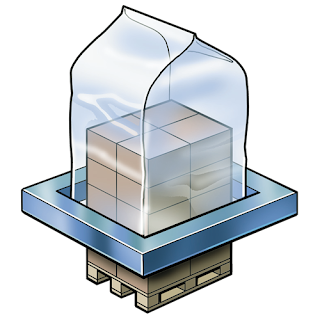Shrink vs Stretch, How to choose the right pallet wrapping method?
Shrink vs Stretch, How to choose the right pallet wrapping
method?
-Stretch Hood
-Stretch Wrap
Cost of Ownership: Properly
evaluating the choice of pallet packaging method goes far beyond comparing
equipment acquisition costs. Several factors can significantly impact the cost
of ownership and, consequently, the return on investment.
Equipment cost: Spiral
stretch-wrapping equipment is available in multiple speed ranges and varying
degrees of automation. With prices ranging from below $10,000 for
semi-automatic low-speed models to $120,000+ for high-speed rotary-arm or
satellite models, there is generally a spiral stretch-wrapping model for every
budget.
Heat shrink-hooding equipment also comes in both semi- and
fully automatic models. The price range is generally between $50,000 for
semi-automatic models (where the operator applies a pre-made shrink bag over
the pallet load) and $200,000+ for fully automatic, high-speed models.
The price of stretch-hooding equipment has come down
somewhat over the past couple of years due to increased competition and the
development of simpler equipment. Prices range from roughly $140,000 for
single-format equipment to $200,000+ for multi-format equipment. For
high-output facilities, it is important to realize that one single stretch-hood
machine can replace multiple spiral stretch-wrap machines due to the higher
achievable speeds.
Film cost. If protection and stability are secondary, the
film cost for spiral stretch-wrapping a pallet load can be very low because of
minimal film thickness and comparatively high pre-stretch percentage. Where
protection and stability are critical, however, multiple layers of stretch-wrap
film must be applied for stability, and a top-sheet added for protection. This
can increase film cost per pallet.
Heat shrink-hooding is significantly more expensive in film
cost per pallet than either of the other two methods because of the need to
oversize the film hood prior to shrinking. The film cost per pallet for
shrink-hooding can easily exceed that of stretch-hooding by 40 percent or more.
And substantial energy costs associated with heat shrink-hooding add to the
cost-disadvantage of this method.
For stretch-hood film, recent developments have enabled the
use of thinner films with significantly higher pre-stretch percentages than was
previously possible. This makes stretch-hooding competitive with spiral
stretch-wrapping in terms of film cost per pallet load for applications where
moderate load stability and protection is required.
However, for low speed/low product value applications where
output/product value does not justify investment in fully automatic equipment,
stretch hooding is not an option as no semi-automatic models are available.
Labor and maintenance cost: Spiral stretch-wrapping
equipment is simple to operate and maintain. Semi-automatic models, in
particular, require little training for operation. Maintenance costs, however,
tend to the high side because of the quantity of moving components.
The drawback of spiral stretch-wrap equipment is that the
relatively low-volume film rolls require frequent replacement at higher
throughputs. Some manufacturers do offer an automatic film change option;
however, this can be an expensive option, adding complexity to the equipment.
Having to replace the film roll at short intervals reduces line availability
and increases direct labor costs. The resulting costs from outdoor storage, or
measures to protect from the weather, can be significant and must be included
in a total cost-of-ownership analysis.
Heat shrink-hooding equipment is moderately
maintenance-intensive in comparison with spiral stretch-wrapping and stretch-hooding,
as heat shrink-hooding involves more wear parts that require replacement at
regular intervals.
With stretch-hooding the film roll can be up to 39-inches in
diameter, easily allowing for 10 times longer film change intervals and
increasing line availability. The roll change typically taking no more than 10
minutes to return the machine to production. Unlike stretch-wrapping,
adjustments to machine settings are rarely necessary, thus ensuring consistent
high-quality packaging results.
Moreover, with fewer wear parts than
stretch-wrap machines, stretch-hooding equipment requires little maintenance,
and five-sided pallet protection eliminates the need for protective tarps.
Keep in mind, however, that handling equipment (i.e. a
forklift) is needed for stretch hood film handling due to the size and weight
of the film roll. Film rolls for stretch
wrapping are smaller and lighter and can be handled without equipment. Also, a
stretch hood machine is not portable as some low budget stretch wrap machines
are. This means that there are costs associated with moving the machine, should
this become necessary in the plant.
More info at: www.quickpakinc.com






Comments
Post a Comment